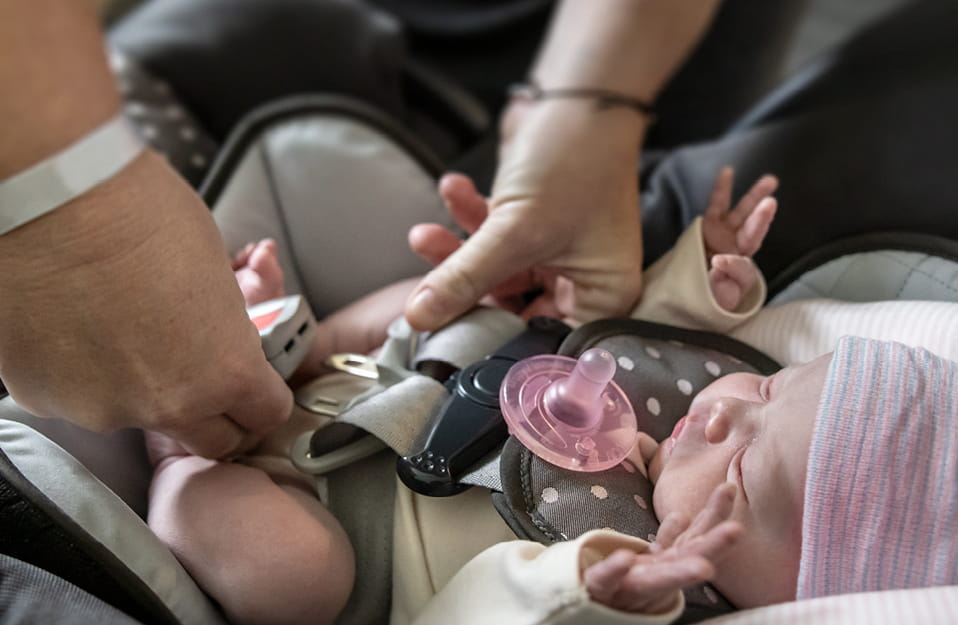Bleeding in early pregnancy: When should you see your doctor?
Light bleeding or spotting during your first trimester is common. Here’s what it could mean (and when to seek help).
During pregnancy, your body changes. A lot. And in early pregnancy, you may deal with some pretty substantial hormonal shifts. Between mood swings, exhaustion and morning sickness, you might not feel your best. But there’s another symptom that can happen in early pregnancy that you might not be thinking about — bleeding or spotting.
“Bleeding in early pregnancy happens to 20 to 40% of women,” says Deidre Heber, DO, OB-GYN at Geisinger. “Most of the time, it’s nothing to worry about.”
Potential causes of first trimester bleeding
Bleeding during the first trimester can look different for everyone. The amount can range from light to heavy. For some, it can be intermittent. Others may have more constant bleeding or spotting. And it may or may not be painful.
Here are a few things that might be behind it.
Implantation bleeding
Early in pregnancy (sometimes before you know you’re pregnant), you may have some spotting when your period is due. This common occurrence is called implantation bleeding. “It happens between 6 and 12 days after conception as the fertilized egg implants into your uterus,” Dr. Heber says. This bleeding is typically light and may last for a few days.
Cervical changes
During pregnancy, there’s increased blood flow to your cervix. Having sex or getting a Pap smear, which cause contact with the cervix, can trigger light bleeding. Other cervical changes that can trigger bleeding include:
- Polyps
- Minor infections
- Cervical ectropion (when cells from the inside of the cervix move to the outside)
Hormones
In the early weeks of pregnancy, your body starts making the hormones you need to sustain a pregnancy. This change can cause your progestin levels to drop. That drop may lead to spotting or light bleeding.
Miscarriage
Since miscarriages are most common during the first trimester, worrying about bleeding is normal. Light bleeding or spotting doesn’t automatically mean you’re miscarrying. But if your bleeding is heavy, bright red or you’re passing clots and in pain, contact your healthcare provider. They can explain next steps.
Most women who miscarry go on to have healthy pregnancies. But having a miscarriage is a loss that families may need help handling. Don’t rush the grieving process, and find a support group or counselor if you feel you need it.
Ectopic pregnancy
An ectopic pregnancy happens when a fertilized egg implants outside the uterus, like in your fallopian tube. When that happens, it can lead to heavy bleeding, pain and other serious symptoms. “An ectopic pregnancy is an emergency,” says Dr. Heber. “If you have symptoms, contact your provider immediately.”
When to call the doctor about bleeding
Call 911 or go to the nearest emergency room if you have any of these symptoms:
- Severe pain or cramps low in the abdomen
- Severe bleeding, soaking greater than one heavy pad per hour, with or without pain
- Passage of blood clots or tissue
- Dizziness or fainting
- Chills
- Fever higher than 100.4° F
If you’re pregnant and bleeding heavily, don’t use a tampon. Wear a pad instead. “Doctors need to know how much you’re bleeding to gauge the severity,” says Dr. Heber.
And if you’re passing tissue, consider bringing it in for testing.
Your doctor may use an ultrasound to determine the cause of your bleeding. Once they find the cause, they’ll work with you on a treatment plan.
Healthy parent, healthy baby
Building good habits now can help you have the healthiest pregnancy possible. Dr. Heber makes these suggestions to help you (and your baby) feel your best.
- Eat a nutritious, well-balanced diet
- Exercise regularly
- Avoid alcohol, recreational drugs and cigarettes
- Reduce caffeine intake to 1-2 cups a day
- Attend regular prenatal visits
- Take your prenatal vitamins
Next steps:
Meet Deidre Heber, DO
Learn about pregnancy care at Geisinger
Separating fact from fiction: 6 pregnancy myths





